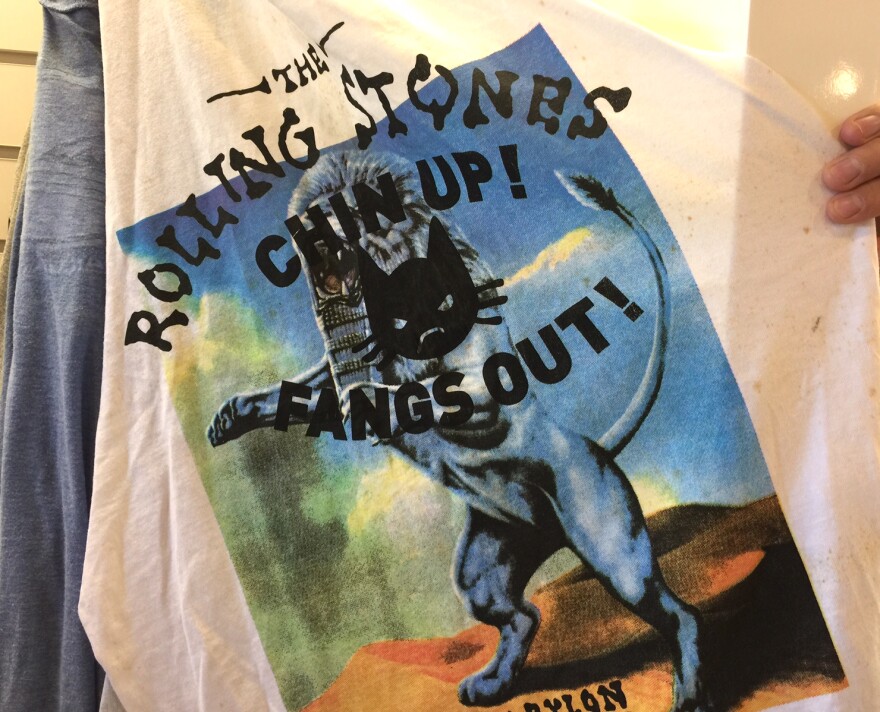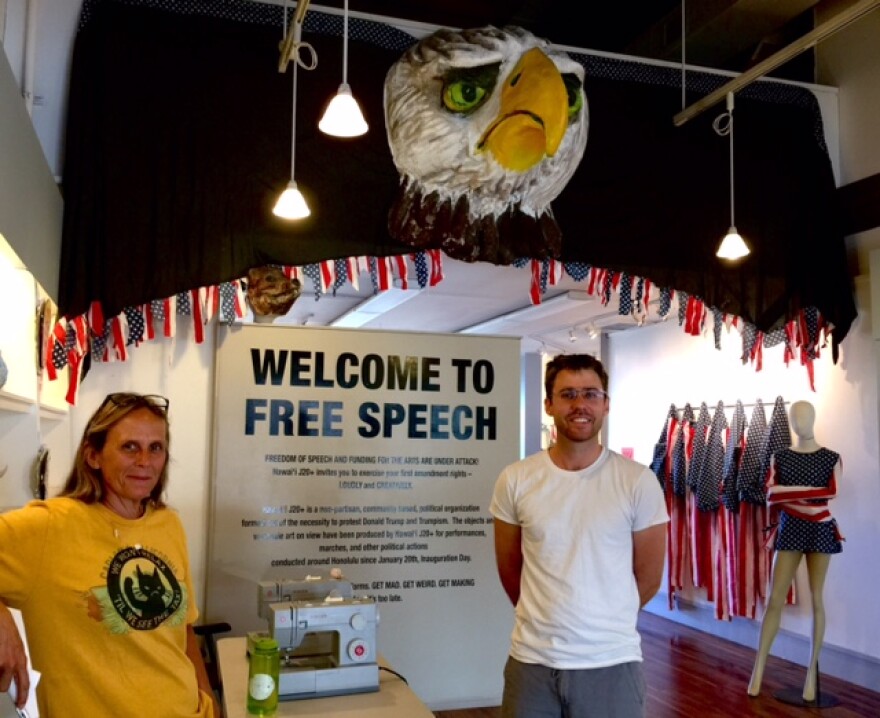Ward Warehouse was expected to last fifteen years when it opened in 1975. Now, over 40 years later, it will close in August to make way for a highrise. Right now, along with sales galore, a few interesting new shops have taken old spaces. The Paradise Cove art collective has a storefront, and so does J20+, an offshoot of the January 20th Inauguration Day protests. HPR’s Noe Tanigawa reports on their exhibition, Welcome to Free Speech.

“Welcome to Free Speech!” opens this Saturday with activities, projections, and entertainment from 5-9pm. Located between Loco Boutique and T&C, the J20+ exhibit will be up through July 7th.

The J20+ shop at Ward Warehouse is not your everyday retail establishment. A project of the Art and Shenanigans crew of J20+, which includes several well known local artists, this space is distinctly anti-Trump. I asked UH art professor, textile artist, Mary Babcock, are you concerned about appearing so partisan?
Babcock: I’m not at all worried about being partisan. It’s a funny thing these days, speaking out against injustice is being labelled partisan. I don’t see speaking out about wrongs as having any alignment to any particular party. It seems like a distraction to me, as another way to squelch public dissent is to categorize it and label it this particular way, and therefore it’s somehow a threat. I think it’s really important that we be able to look at specific people, specific policies and have a critique of those.

Babcock: I’m very concerned about the direct and indirect threats to free speech. I’m very concerned about the way immigration has been handled and how it condones violence. I’m very concerned about health care, I’m very concerned about the increase in militarization. For me, the attacks on free speech are incredibly important to look at and be aware of.
What attacks on free speech? This is a president who is communicating with us so directly, he’s pretty free.
Babcock: He’s working in the administration quite hard to intimidate. Even the discussion of whether something is partisan or not I think it’s another way to make people nervous their funding is going to be threatened. There are threats to free speech too that people might not necessarily connect the dots, like Trump‘s idea for slashing the budget for the National Endowment for the Arts and the National Endowment for the Humanities and the Center for Museum and Library Services. Their combined budget for the three agencies is $298 million dollars. Trump wants to slash the NEA to 20% of its current budget with the full intent of shutting it down and not providing any new grants. The slashing of the NEA and the NEH is a way to squelch one of the most protected areas of free speech which is creative expression. Those are very real threats.

How have students been responding to this?
Babcock: There are some very active students trying to figure out ways to respond, but here are a lot of people that are caught in fear, caught in the sense that their actions make no difference, and are apathetic. That’s concerning to me: Apathy or fear of being political, that being political is somehow inappropriate.
I think a lot of students are scared. They’re scared of speaking up, they’re scared of standing out. They’re scared, and that affects education overall. As a teacher you watch students thrive when they feel safe, when they feel like their voices make a difference, when they have room to explore and be creative and take risks, and that doesn’t happen in a context driven by fear.
Painter Jan Dickey, and member of Art and Shenanigans, has been helping sit the exhibition.
Dickey: One great thing about being in this space is a couple days ago I had a great conversation with someone who was a Trump supporter judging from his questions. He came in and asked simple questions like why do you think Donald Trump’s a racist? And I feel like we got a sense of what the other person knew and what facts they were drawing from. Because I’ve had conversations with Trump supporters in the past where something like climate change comes up and it seems like we’re actually looking at different facts.
How can you imagine ever coming together?
Dickey: If there’s a way for people to maybe get on board and start believing the same facts of reality and start believing the same sources, maybe that’s the way forward.
Babcock: I think maybe there’s maybe a bad rap about what political action is. That somehow it’s heavy and it’s depressing, but I think what people don’t see is that it can also be really fun. And it’s a great way to build community. I’ve made some awesome friends thanks to Mr. Trump. That’s one thing I’ll give him, I guess.

I really encourage people to speak up because when you speak up once, you feel emboldened and the next time you speak up, you can speak up more. For me, that’s been a great gift, actually, to see my voice does make a difference. So speaking up about an issue has ramifications for how I am in my everyday life as well. And it’s fun. The J-20 crew, we’re fun group of people, actually. Our protests, we have a lot of fun at them. They’re real issues, it’s really important we speak out about them, but it’s also important to have a good time doing it.
Babcock: If I could help in any way here, it’s to help people see that these are now ethical decisions. They’re not just political decisions. We can’t just step outside the ethical world, our actions or inactions, they all count. They all are part of our way of being in the world so to just turn away and choose to be apolitical doesn’t help you step out of the system of values we live in.





